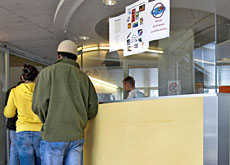Illegal immigrants win reprieve in Zurich

A special commission is to hear the case of perceived injustices against illegal immigrants in canton Zurich following a two-week protest.
Around 150 rejected asylum seekers occupied a church last month claiming that Zurich was more draconian than other cantons. The authorities have accepted the new advisory body but have given no sign that rules will be relaxed.
The compromise solution was hammered out on Monday during talks between representatives of the immigrants, the cantonal authorities and church leaders. A commission including various sections of the community will now hear claims of extreme hardship.
The protestors ended their unwelcome occupation of Zurich’s Prediger Church after receiving an invitation to move to another church on a temporary basis. But it was still unclear after the talks whether they would continue their standoff or disperse.
Stefan Schlegel, of the “Residency Rights for All” group that supports the illegal immigrants, gave a cautious response to the commission, calling it a “positive point”. He added that it was unclear when it would start and what powers it would have.
No debating group
But canton Zurich cantonal government member Hans Hollenstein, responsible for security, promised that the new body would have teeth.
“It is safe to say that the commission must be able to act. I do not want this to be just a debating group,” he said.
Rejected asylum seekers who do not leave Switzerland are known as sans-papiers (without documents) and are not allowed to work. They are reliant on cantons for subsidies and to support applications for special “hardship” visas that allow them to find employment after five years.
It is estimated that there are 300,000 people residing illegally in Switzerland with around a tenth of that number in canton Zurich.
Residency Rights for All has criticised the canton for giving just SFr8.50 ($7.70) a day in the form of supermarket vouchers and for rejecting too many hardship visa applications. Zurich refused to forward any applications to the federal authorities last year and sent just four in 2007, compared with other smaller cantons that support dozens of cases each year.
The Zurich authorities also came under fire for demanding passports as a form of identification for visa applications when other forms of ID are acceptable by law.
Tough laws
Hollenstein responded by calling on the federal authorities to issue uniform regulations for all cantons to help solve the “delicate situation”. But he refused to cave into demands to change the procedures in canton Zurich.
One protestor, who goes by the name of Berhanu, said the blame does not lie with canton Zurich or even with Switzerland. The Ethiopian has been turned down twice for asylum during his eight-year stay in Switzerland.
“The asylum system in the whole of Europe is riddled with double standards,” he told swissinfo. “If there is a commercial or strategic interest in a country then there are no human rights abuses. They only exist if the West has no special interest there.”
Switzerland toughened its national asylum system in 2006 after a referendum (see box). The move was criticised by the United Nations and illegal immigrants in Zurich protested by occupying the city’s Grossmünster cathedral in December 2007.
swissinfo, Matthew Allen in Zurich
The number of asylum seekers in Switzerland peaked at 48,000 applications in 1999, with the majority coming from Serbia and Kosovo.
In 2004, the government stopped welfare benefits to rejected asylum seekers and the number dropped to 14,250.
In 2006, 10,500 people sought asylum in Switzerland and 19.5% were accepted. The Swiss voted in a referendum in the same year to tighten asylum legislation, turning down applicants that did not have a passport without a valid reason and doubling the length of detention for rejected asylum seekers to two years.
The government recommended the measures after releasing a report that estimated there were 300,000 illegal immigrants living in Switzerland – 9,000 of whom had jobs, while others were suspected of carrying out criminal activities.
The new laws were criticised by the United Nations. The Swiss Federal Administrative Court in 2007 overruled the clause that allowed the authorities to expel asylum seekers without identification within 48 hours.
Switzerland received a total of 10,390 asylum applications in 2007.

In compliance with the JTI standards
More: SWI swissinfo.ch certified by the Journalism Trust Initiative












You can find an overview of ongoing debates with our journalists here . Please join us!
If you want to start a conversation about a topic raised in this article or want to report factual errors, email us at english@swissinfo.ch.